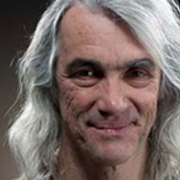
John Gibson
John Gibson showed his talents early. At 16, he composed his first rock opera; at 21 he was musical director of Dunedin’s Fortune Theatre; in 1983 he moved to Auckland's Theatre Corporate.
The concept of performance took on a new note when Gibson was picked to act on 1984 television series Heroes, playing a keyboardist in an aspiring pop band, opposite newbie talents Michael Hurst, Jay Laga’aia, and Margaret Umbers. Off-screen he composed songs for the fictional band, in the process winning a Gofta award, alongside the show’s musical director Stephen McCurdy.
By the time Heroes went into its second series Gibson was increasingly in demand as a composer, with soundtracks under his belt for the 25-minute-long The Fastest Gun Down-Under and TV's Journeys Across Latitude 45 South. Since then he has composed music for a wide range of projects, from dance to Shakespeare to modern theatre, including collaborations with Michael Hurst and Gibson’s wife, noted choreographer Shona McCullagh. His theatre CV now runs to more than 100 scores, and 150 plus original songs.
Gibson’s range of screen composition is equally as impressive. He has composed for short films (early digital short Red Scream, Donuts for Breakfast), songs and music for pre-school show The Party Animals, and kidult drama (Steel Riders), plus many documentary projects. Among the latter are a number of collaborations with director Richard Riddiford, including two-parter Old Money (1999), which profiles power families in New Zealand business, and Tarawera (2000), which recreates the 1886 eruption of Mount Tarawera. He also composed the opening theme for long-running hit Epitaph.
Gibson has also worked on many natural history programmes: after providing the music for 1985 series Journeys Across Latitude 45 South (which saw Peter Hayden traversing the South Island from Otago to Fiordland), in 1988 Gibson was called on to do double-duties on international series The World at Your Feet, when he joined Hayden and other walkers traversing the Milford Track; Gibson also composed the music.
In 2007 he worked with Jack Body on the score for Vincent Ward’s Rain of the Children. Ward praised Gibson's musical contribution as “by turns beautiful, driven, dramatic, humorous, tender”, and noted Gibson's adept work as the film’s music editor, using the Pro Tools programme to mix image and soundtrack. Gibson has been commissioned three times to compose for the New Zealand International Festival of the Arts: a dance theatre work, a large scale theatre work and a score for Wellington’s Carillion.
Sources include
'John Gibson' (Profile). Human Garden productions webiste. Accessed 30 April 2012